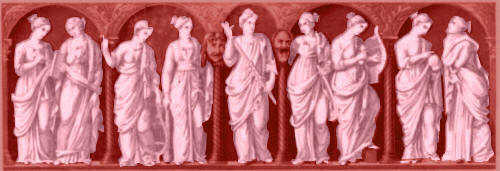

The muses are the nine goddesses that hold power over the arts and inspire those who excel at them. Nine is a multiple of three, which is the holy number of the goddess. They inspire, influence prophecy and psychic arts. These gifts are within the guidance of the dark moon.
They are the daughters of the Greek god Zeus and the Titaness Mnemosyne (memory). Each goddess contained power over certain areas of literature, arts, song, memory, or science. Calliope ruled over epic poetry; Euterpe, lyric poetry; Clio, history; Thalia, comedy; Urania, astronomy; Melpomene, tragedy; Tersichore, choraldance and song; Erato, love poetry; and Polyhymnia, sacred poetry.
Their areas of inspiration have evolved to meet modern day times. Urania deals with astrology; Thalia comedians; Melpomene inspires those who write tragedies; Clio, the trumpet player, helps historians record the past; Calliope, who is the leader, helps the writers and speaks of serious literature; Euterpe, the flute player, guides composers and those who play wind instruments: Terpsichore, the guitarist, aids players of string instruments and dance; Polyhyminia assists actors and creators of song; and Erato inspires writers of romantic prose and poetry.
Apollo is the leader of the nine muses, and their companions are: The Charities, The Horae, Eros, Dionysus, Aphrodite, Harmonia, and Himerus. Athena caught and tamed the well know dream horse we all know today. Pegasus. The Sphinx also learned her riddle from the muses. Aristaeus learned the arts of prophecy and healing. And Echo learns how to play music. Hera who is the queen of the gods, summoned the sirens to enter a singing contest with the muses. When the muses won they took the feathers of the siren and made crowns of them.